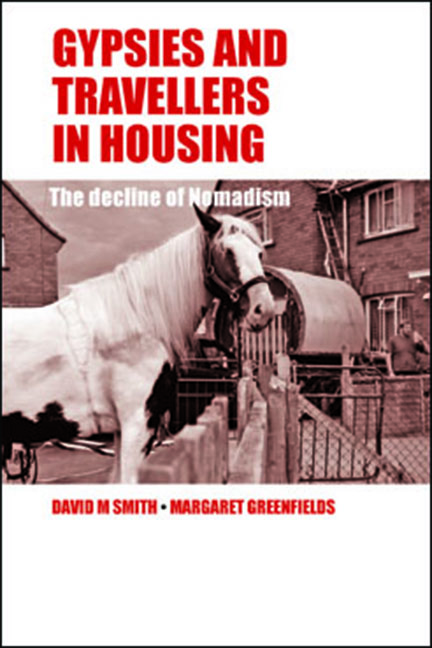Book contents
- Frontmatter
- Contents
- List of tables
- Acknowledgements
- Foreword
- one Introduction
- two Space, surveillance and modernity
- three Gypsies, nomads and urbanisation: a social history
- four The research sites and population sample
- five Routes into housing
- six Housing transitions
- seven Gypsies, Travellers and gorjers: conflict and cooperation
- eight Recreating community
- nine Young people in housing: aspirations, social relations and identity
- ten Conclusion
- Appendix A Methodologies
- Appendix B Glossary of words and terms
- References
- Index
ten - Conclusion
Published online by Cambridge University Press: 03 February 2022
- Frontmatter
- Contents
- List of tables
- Acknowledgements
- Foreword
- one Introduction
- two Space, surveillance and modernity
- three Gypsies, nomads and urbanisation: a social history
- four The research sites and population sample
- five Routes into housing
- six Housing transitions
- seven Gypsies, Travellers and gorjers: conflict and cooperation
- eight Recreating community
- nine Young people in housing: aspirations, social relations and identity
- ten Conclusion
- Appendix A Methodologies
- Appendix B Glossary of words and terms
- References
- Index
Summary
Social inclusion, diversity and cultural resilience
As outlined at the beginning of this book, the key objectives of this study were to highlight the main causes behind the settlement of Britain's travelling communities and to explore the individual and collective manifestations of this trend. We have discussed the ways in which longer-term processes of settlement and sedenterisation have occurred in tandem with wider processes of urbanisation and industrialisation. In this study we have made manifest the stark impact of the implementation of successive post-war government policies, transforming an entire culture through making nomadic lifestyles progressively untenable.
The enforced immobilisation of the majority of Britain's Gypsies and Travellers and their continuing marginalisation highlights a number of basic contradictions in what is purported to be a diverse yet socially inclusive nation while raising fundamental questions over the nature of inclusivity and ‘tolerance’. Enforced settlement (which, as the empirical sections of the text testify, has been the majority experience for housed Gypsies and Travellers) has for many of our participants been a deeply dispiriting experience which has left a legacy of social exclusion, bewilderment and resentment mirroring the narratives of Aboriginal peoples in America, Australia and elsewhere (ALRC, 1986; Manson et al, 1996). The relentless drive to sedentarisation regardless of the human cost, begs the question of whether political support for ‘choice’, minority lifestyles and endorsements of equal rights is motivated primarily by political expedience, as a diversion from more deep-seated economic and class-based social divisions and a malaise in citizen engagement across the UK
McGhee (2005) suggests that ‘intolerance of intolerance’ represents more than political ‘lip service’ and is in fact part of a wider political project striving towards commonality in respect of the ‘shared values and standards of an emergent citizenship for a multi-ethnic, multi-lingual and multi-faith Britain’ (2005, p 12). Whilst on the surface this may seem laudable, it does raise the problematic spectre of a mono-cultural amorphous model which submerges class, culture and individual identities and practices. These policy goals are also continually frustrated both by subversive individuality and undermined, as Tam (2005) notes, by the spread of insecurity and social fragmentation engendered by economic forces and an increasing concentration of power.
- Type
- Chapter
- Information
- Gypsies and Travellers in HousingThe Decline of Nomadism, pp. 197 - 210Publisher: Bristol University PressPrint publication year: 2013



